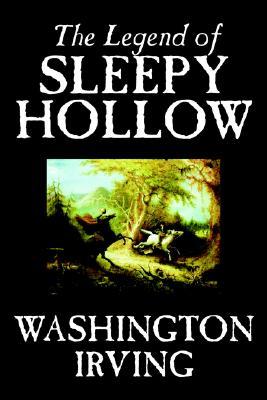First up, I thought I'd tackle one I'm currently watching;
The book, titled The Legend of Sleepy Hollow, was written by Washington Irving and originally published in 1820.
The chief part of the stories, however, turned upon the favorite specter of Sleepy Hollow, the Headless Horseman, who had been heard several times of late, patrolling the country; and, it was said, tethered his horse nightly among the graves in the churchyard. The story was immediately matched by a thrice marvelous adventure of Brom Bones, who made light of the Galloping Hessian as an arrant jockey. He affirmed that on returning one night from the neighboring village of Sing Sing, he had been overtaken by this midnight trooper; that he had offered to race with him for a bowl of punch, and should have won it too, for Daredevil beat the goblin horse all hollow, but just as they came to the church bridge, the Hessian bolted, and vanished in a flash of fire. All these tales, told in that drowsy undertone with which men talk in the dark, the countenances of the listeners only now and then receiving a casual gleam from the glare of a pipe, sank deep in the mind of Ichabod...
This book is something of a ghost story, with a lot left up to the reader's imagination, but there's also some romance and, for such a short little book, quite a bit of local descriptions.
So, how does it compare to the newest take on Sleepy Hollow? Well, in the show's defence, it claims to be merely inspired by the novel, but some things were nailed and some were made up whole cloth. (About what an inspiration should be, I'd guess.) I'll be honest with you, there's no way I can talk about this show without giving spoilers. I'll try to limit it to the first couple of episodes of season one, but if you have an interest in this show and don't know anything about it, beyond the premise 'Crane and the Headless Horseman wake up in modern-day New York' stop now. Seriously, you'll enjoy the first couple of episodes much more if you're as blindsided by everything as I was.
That's right, after this point: There be SPOILERS!
(You've been warned.)
In 1781, Ichabod Crane killed the Headless Horseman (who, notably had a head until that point) at the same time that the Horseman kills him. The resulting blood mingling causes, when the Horseman is resurrected, Crane too to come back to life. It isn't long before the Horseman begins a killing spree.
Leftenant Abbie Mills looses her mentor in one of these attacks. Crane, acting suspicious, draws the attention of the local police - but Abbie starts to wonder if maybe he has the answers she's looking for.
Sounds comparative, right? Wrong, this is just the 'bare bones' version of the show.
Book vs. Show
In the book, Ichabod Crane was a somewhat retiring schoolteacher. In the show, he is a former Oxford Professor, before he joined the British side in the Revolutionary war. After coming to America, he switched sides and became a spy and soldier working under the command of General George Washington.
The Headless Horseman isn't a Hessian (German) soldier killed by beheading, but he is one of the Four Horsemen of the Apocalypse - the rider on the pale horse: Death.
Katrina Van Tassel, the young woman Ichabod was wooing in the book, has already been wooed in the show and she is now Katrina Crane. She was also a witch.
Ichabod and Abbie are the two Witnesses to the Apocalypse mentioned in Revelations. (Yeah, I got no comparative for the book.)
Ultimately, they could have changed the name of Ichabod Crane and the name of the town, and there would be few, if any, parallels between the two works. It seems more like The Legend of Sleepy Hollow meets book of Revelations.
That's not to say the source material wasn't loved. They could have chosen any other profession for Crane, but they kept him being a schoolteacher. The Chief of Police has the last name of 'Irving'. It's these little touches that makes me think the creator(s) had fun with the original story.
Final Verdict
Accuracy: * (Pretty much everything has been changed but oh well.)
Homage: ** (A few nice additions, but could have been more.)
Enjoyment: *** (Although somewhat unexpectedly, the series is fun.)
(Special bonus for 'horror'.)
Scare Factor: *** (Moderate. A creepy scene or two an episode, but it's not dwelled on.)
Well, I hope you enjoyed this new feature. I'd love to know what you think about the book or the show. Or both.
